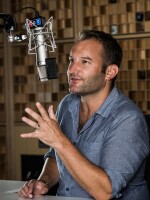MICHELE NORRIS, host:
From NPR News, this is ALL THINGS CONSIDERED. I'm Michele Norris.
ROBERT SIEGEL, host:
And I'm Robert Siegel.
Senator Barack Obama began a new push to challenge Senator Hillary Clinton for the Democratic presidential nomination. Today, he spoke to students at DePaul University in Chicago.
Five years ago, Obama spoke out against the war in Iraq. And now, he argues that his position then demonstrates the kind of sound judgment needed in the Oval Office.
NPR's David Greene reports.
DAVID GREENE: Barack Obama had a contradictory test today. He wanted to present himself as a fresh face with a new way of thinking on foreign policy. But he also wanted to convince people that he has enough experience to be commander in chief.
So Obama's campaign first brought out 79-year-old Ted Sorensen, the legendary adviser and speechwriter to John F. Kennedy. Sorensen said he likes Obama's talk of engaging leaders from unfriendly countries. Sorensen said that's exactly what JFK did during the Cuban missile crisis. And then, he apologized.
Mr. THEODORE SORENSEN (Special Counsel, Speechwriter and Adviser to JFK): Now, I'm getting so wrapped up telling you about the Cuban Missile Crisis that I have forgotten my main job, which is to introduce the candidate.
GREENE: Once introduced, Obama immediately reminded his audience that this was an important anniversary for him.
Senator BARACK OBAMA (Democrat, Illinois; Presidential Candidate): Five years ago today, I was asked to speak at a rally against going to war in Iraq.
GREENE: That rally was right here in Chicago. Obama was a young state senator at the time. Looking back today, he said he made the right decision to oppose the war. And he said members of Congress who voted to authorize the war at the time now bear responsibility.
Sen. OBAMA: So let's be clear. Without that vote, there would be no war.
(Soundbite of applause)
GREENE: He didn't mention anyone by name, but his chief target was unmistakable. Hillary Clinton voted to authorize the war in 2002. Obama said she and other lawmakers have suggested they didn't expect the president to invade so quickly.
Sen. OBAMA: But the Congress, the administration, the media, and the American people all understood what we were debating in the fall of 2002. This was a vote about whether or not to go to war. That's the truth as we all understood it then and as we need to understand it now. And we need to ask those who voted for the war, how can you give the president a blank check and then act surprised when he cashes it?
(Soundbite of applause)
GREENE: Obama said that as president, he would move his foreign policy beyond Iraq. For example, he said he backs a plan put forth recently by former secretary of state Henry Kissinger and former democratic senator Sam Nunn to eventually rid the world of nuclear weapons. But it wasn't long before Obama returned to Iraq in his speech. He told the roomful of students that somewhere in Iraq, a soldier their age is toiling under a hot sun.
Sen. OBAMA: He's getting in a Humvee. He's going out on patrol. He's lost a buddy in this war. Maybe he's lost more than one. He risked his life yesterday, and he's risking his life today, and he's going to be risking his life tomorrow. So why do we reject cynicism? We reject it because of men and women like him. We reject it because the legacy of their sacrifice must be a better America.
GREENE: Afterwards, 18-year-old freshman Ryan Henderson(ph) said Obama caught his attention when he talked about that soldier.
Mr. RYAN HENDERSON (Freshman, DePaul University): To think that, like, that could be me, that could be someone that I know and, like, to be losing people so rapidly and so quickly, it's - it really hit home.
GREENE: Obama struck just the note he wanted in his hometown today, but most media coverage focused on reports that his strong fundraising in the third quarter was not enough to match that of Hillary Clinton, who raised $22 million for the primaries and added 100,0000 new donors.
David Greene, NPR News, Chicago. Transcript provided by NPR, Copyright NPR.






